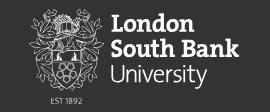About Business Project Management Msc in London South Bank University (LSBU)
This masters course is for individuals wishing to further their careers in project management or consultancy. In today's business environment, the skills of the project manager have never been more in demand. Organisations, businesses and governments are becoming increasingly aware of the strategic importance of effective project management for gaining a competitive advantage.
A masters degree in the rapidly growing area of project management will help develop skills that are highly sought-after globally in almost every sector.
This course is particularly relevant for professionals who wish to be able to run complex projects with a range of stakeholders, managing all phases to time and to budget.
This course is underpinned by the core competencies at the heart of the Association of Project Managers (APM), so you can be sure that what you learn is contemporary, relevant, and directly applicable in the workplace.
Our aim is to help you develop a range of technical skills that will be complemented by transferable soft skills so that you develop as an independent learner and thinker who is comfortable tackling the two key ideas in modern Business Project Management: choosing the right project and doing the project right. This means you'll be able to identify and select projects that are going to benefit an organisation, and then deliver them within the scope required, to the budget and on schedule. With that skill set, it isn't hard to see why graduates from this course are in high demand.
The course also provides professional training to gain a relevant project management certification examination, for instance PRINCE2.
- A bachelor's degree in a relevant subject (e.g. business, business analytics, management science, economics or finance) or at least 2:2 (honours) or Bachelor degree equivalent to UK Second Class Honours Lower Division and at least two years' experience working in business.
- A bachelor's degree in a non-relevant subject of at least 2:2 (honours) standard, and at least five years' experience working in business.
- We are happy to consider other qualifications combined with appropriate experience that are equivalent to the amounts outlined above.
- You'll be expected to have first-hand appreciation of general business processes, business planning cycles and the general business environment. We expect you to have been involved in business decision making at an operational level, and to have supported strategy development at a departmental level. You'll also have some quantitative business skills and be familiar with handling and manipulating quantitative data which could have been acquired either through a relevant bachelor degree or via five years' work experience.
The quantitative business skills we are looking for from you are:
- The ability to use appropriate ICT to investigate, analyse and summarise numerical data.
- A knowledge of the standard mathematical models used to support decision making in an area of business activity such as accounting, finance, forecasting, investment, risk analysis, production planning, inventory control etc.
- The ability to produce and interpret reports produced in support of quantitative decision making in an area of business such as those listed in the bullet point above
London South Bank University (LSBU) Highlights
| University Type |
Public University |
| Campus Setting |
Urban |
| Establishment Year |
1992 |
| No. of Schools |
7 |
| No. of Campuses |
2 |
| No. of Residences |
4 |
| Graduate Job Rate |
89% |
| Student-Teacher Ratio |
17:1 |
| External Income |
£2 million |
| Cost of Attendance |
£14,780 |
| Applications Accepted |
Online |
| Work-Study |
Not available |
| Intake Months |
January and September |
| Mode of Program |
Classroom and online |
London South Bank University Average Tuition Fees And Other Expenses
| Course |
Tuition Fee |
| Undergraduate |
£13,780 |
| MSc; MA; PG Diploma |
£13,780 |
| MBA |
£15,100 |
| MPhil; PhD |
£13,780 |
The weekly cost of living for students living in hostel accommodation and private accommodation is, respectively, £206–356 and £225–515.
London South Bank University Admission Process
- Application: The international students may apply by filling the LSBU application form. In absence of the preferred course in the list, UG and PG students may apply, respectively, via ‘UCAS’ and ‘UKPASS’.
- Application deadline:
UG Courses: January 15 (UCAS); June 30 (UCAS Extra)
PG Courses: There is no fixed closing date for PG courses.
- General requirements: Academic transcripts, official degree completion certificate, English language certificate.
- Additional requirements: Passport copy, current visa, 2 academic references with official stamp, research proposal (PG research students), CV.
- English Proficiency Test: The students need to demonstrate English language proficiency through the tests given below.
| Test |
UG |
PG |
| IELTS |
6.0 |
6.5 |
| PTE Academic |
52 |
60 |
| GCSE/O-Level/IGCSE |
Grade C |
Grade C |
| Cambridge English: Advanced |
Grade C |
Grade C |
